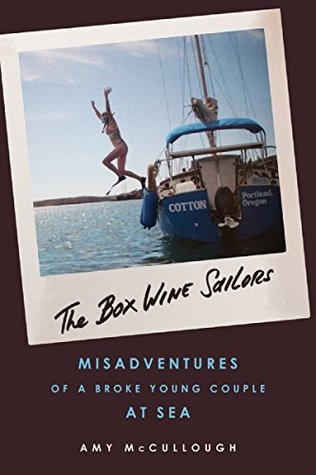
The Box Wine Sailors: misadventures of a broke young couple at sea by Amy McCullough
Amy and her boyfriend Jimmie want to figure out a way to take a year off work and have an adventure. They decide that the cheapest way to do that is to buy an old sailboat and sail from Oregon to Mexico - neither of them grew up sailing or have any real training. They watch a few DVDs, read some books, and spend a year sailing once a week to prepare. They saved as much money as they could in a year and lived as cheaply as possible in their year of sailing. While I admire them for going for their dream right now and not waiting until retirement or a "better" time, it seems like their year of sailing was more stressful than relaxing or fun. They ate really cheap, crappy food and never really slept much or well. After it was over and they spent their first night off the boat Jimmie said it was the first night of real, restful sleep he had had in over a year. Not to say they never had fun or a relaxing time, but it really seemed like a LOT of their time was very stressful. Overall, it was good, but it definitely didn't inspire me to want to do anything similar!
Some quotes I really liked:
"It turns out the only difference between bravery and stupidity is a happy ending. If we had died, if our soggy carcasses had washed up on some California beach months after our departure, everyone would have said that we were foolish. Or at least they would have thought it. Sailing the Pacific on a twenty-seven-foot boat, with no experience? Figures...But we lived. And so we are brave." (p. 1-2 of "Sensible" Cruising)
"Often, the thing that is the scariest is not the actuality of your situation but what your imagination sees as its potential amplification. The unknown. The unknown. The unknown. It haunts you. And it can never be answered until it is already happening. And then, an already worse unknown has formed in your brain." (p. 12 of Desperately Seeking Social)
Some quotes I really liked:
"It turns out the only difference between bravery and stupidity is a happy ending. If we had died, if our soggy carcasses had washed up on some California beach months after our departure, everyone would have said that we were foolish. Or at least they would have thought it. Sailing the Pacific on a twenty-seven-foot boat, with no experience? Figures...But we lived. And so we are brave." (p. 1-2 of "Sensible" Cruising)
"Often, the thing that is the scariest is not the actuality of your situation but what your imagination sees as its potential amplification. The unknown. The unknown. The unknown. It haunts you. And it can never be answered until it is already happening. And then, an already worse unknown has formed in your brain." (p. 12 of Desperately Seeking Social)
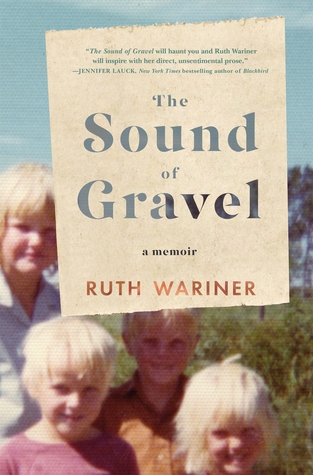
The Sound of Gravel by Ruth Wariner
Ruth Wariner was the 39th child for her father and her mother was his fifth wife. After her father was killed when Ruth was just a baby her mother remarried and became the second wife of Lane. Lane would come to be the worst part of Ruth's childhood. Ruth and her family lived in an adobe hut in Mexico, but since her mother was an American citizen they often came back to the US for her to collect welfare checks and food stamps. As the second oldest girl, Ruth was expected to help care for her younger siblings - her mother would have a total of 10 children before her death. Because of this Ruth dropped out of school around 12 or 13, as did her older brothers who were needed to work and help bring in income for all of Lane's wives and children. Heartbreakingly, two of Ruth's siblings would die in childhood and her oldest sister was so violently schizophrenic that she had to be institutionalized when she was 14. Even worse Lane molested Ruth and at least one of her other siblings and dozens more of his children and stepchildren. After her mother's death, Ruth was finally able to escape Mexico with her remaining younger siblings and their life of poverty and abuse to live with her grandmother in California. Ruth raised her 3 youngest siblings and eventually went on to get her GED, a college degree and a master's degree. The fact that she survived her childhood at all is a miracle. Her story shows the horrors of polygamy and how these cults are basically havens for sexual predators. This is a powerful memoir in the vein of The Glass Castle or North of Normal. I could NOT put this book down and read it in a little over a day.
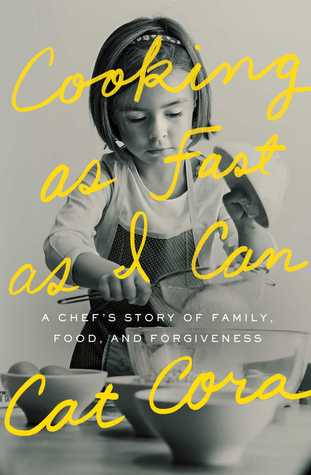
Cooking as Fast as I Can by Cat Cora
Cat Cora grew up in Mississippi enjoying Southern and Greek food since her father's family was Greek. It was nothing unique to her to eat grits with feta cheese. Her parents were both hard-working and loving and taught Cat that working hard is how you'll get far in life. In this memoir you see how Cat worked hard to overcome some serious challenges - she was molested by a family friend, she was gay in time when it was still illegal in her home state, and once she knew she wanted to cook she struggled to get into professional kitchens that often didn't want women. But, she overcame all these struggles to become the Iron Chef Cat Cora most people recognize today. She has accomplished so much and opened so many doors for future women in the professional food industry. Her memoir is a pretty quick read, but it really sheds light on all the things in her life that helped create who she is today.
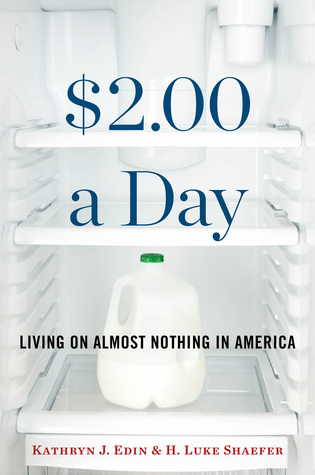
$2.00 a Day: living on almost nothing in America by Kathryn Edin and H. Luke Shaefer
After doing research for over two decades on American poverty, Kathryn Edin discovered something she hadn't seen before - households surviving on virtually no cash income. And not only that, the number doing so has skyrocketed in the last few years. Teaming up with Luke Shaefer, an expert on surveys of the incomes of the poor, they uncovered just how these $2-a-day families are managing to survive. They focus on a few families in different cities and in different circumstances, but all of whom want nothing more than to work a full-time job with regular hours and have their own home for their family. This is really a heart-breaking book because all of the families featured have tried so hard and just keep getting beaten down by their environment, circumstances, an emergency, etc. The biggest thing I noticed among all the people was the low-wage jobs they had worked - pretty much all of them were never scheduled for enough hours to get benefits, had crazy schedules that weren't consistent (and made childcare impossible), and were fired for insanely small infractions. If companies weren't allowed to have these employment practices all of the people featured in this book could have been MUCH better off and managed to create some stability in their lives.
Overall, this is an eye-opening book about a large, yet largely unseen segment of the American population. It will definitely make you feel like a millionaire in comparison.
Some quotes I liked:
"Jennifer rejects the idea of taking 'handouts,' even now in her third spell of $2-a-day poverty in as many years, and so she won't even apply for welfare. Her vision of the good life remains astonishingly humble: she dreams of a full-time job paying $13 an hour, a set schedule, and decent working conditions. She believes that at this wage, she could find a modest apartment in a safe neighborhood, perhaps even afford a reliable used car. Barely making it on $13 an hour is Jennifer's version of the American dream. Yet even this modest aspiration can seem all but out of reach." (p. 47-8)
"Place like the public library where Jennifer, Kaitlyn, and Cole found refuge are crucial to the day-to-day survival strategies of the $2-a-day poor. They offer a warm place to sit, a clean and safe bathroom, and a way to get online to complete a job application. They provide free educational programs for kids. Perhaps most important, they can help struggling families feel they are part of society instead of cast aside by it." (p. 101)
Overall, this is an eye-opening book about a large, yet largely unseen segment of the American population. It will definitely make you feel like a millionaire in comparison.
Some quotes I liked:
"Jennifer rejects the idea of taking 'handouts,' even now in her third spell of $2-a-day poverty in as many years, and so she won't even apply for welfare. Her vision of the good life remains astonishingly humble: she dreams of a full-time job paying $13 an hour, a set schedule, and decent working conditions. She believes that at this wage, she could find a modest apartment in a safe neighborhood, perhaps even afford a reliable used car. Barely making it on $13 an hour is Jennifer's version of the American dream. Yet even this modest aspiration can seem all but out of reach." (p. 47-8)
"Place like the public library where Jennifer, Kaitlyn, and Cole found refuge are crucial to the day-to-day survival strategies of the $2-a-day poor. They offer a warm place to sit, a clean and safe bathroom, and a way to get online to complete a job application. They provide free educational programs for kids. Perhaps most important, they can help struggling families feel they are part of society instead of cast aside by it." (p. 101)
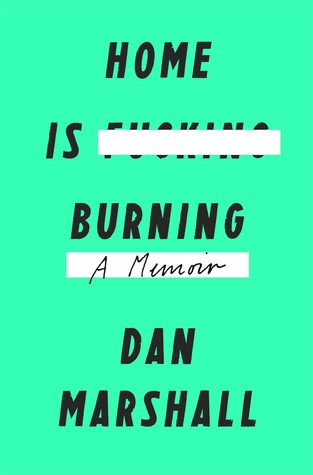
Home is Burning by Dan Marshall
Warning: if you are offended by cursing and bad language this is NOT the book for you!
Dan Marshall is the second of five siblings and felt like at the age of 25 his life was just getting started. He lived in LA, had a beautiful girlfriend, and enjoyed his job. Growing up in Utah the only bad thing about his childhood (besides all the Mormons) was his mom battled cancer off and on since he was 11. So, when he got a phone call in 2007 that his dad had ALS, or Lou Gehrig's disease, his world was turned upside down. His father was always the rock of the family and he declined so quickly that everyone was shocked. Dan ended up quitting his job to go home and help take care of his father. What could have been a terrible depressing story is turned into a laugh-out-loud memoir by Dan and his foul-mouthed family. Their mantra of "fuck Lou Gehrig's disease!" shows how they handled their dad's illness and the strain of caring for him and their mom (her cancer came back shortly after Dan's father was diagnosed). With terrible language and black humor Dan and his siblings come together to help their dad through his final year. Of course there are some serious moments and the very end is a tear-jerker, but overall I would have never thought that a memoir about having two dying parents could be so funny.
A few favorite moments/quotes:
[On Chelsea the 4th child's lack of desire to drive] "...you need to learn how to drive. You're sixteen years old, and our home is burning to the ground with tragedy." (p. 75)
"Before the Lou Gehrig's disease, anytime we were watching a game together and the Jazz scored, we would exchange a high five. We couldn't do that anymore. 'I wish I could high-five you,' I said after Deron Williams nailed a three. My dad didn't say anything. But he did raise his foot as much as he could. I looked at it, a little confused. Carlos Boozer slammed down a jam. My dad raised his foot again. I finally put it together. 'Oh, you want to do foot high fives?' He nodded his head as much as he could. I pulled my chair up to his bed, and we exchanged foot high fives every time the Jazz scored. It wasn't exactly like watching the game together in the Delta Center, but it was better than nothing." (p. 131)
[On a Lou Gehrig's support group meeting] "Those accompanying the person with ALS to the support group meeting usually looked tired and had more to say than the two hours would allow. Bags under their eyes. Shoulders slumped. Hadn't been fucked for months, maybe years. In other words, I fit right in. These were people who would really go for the free Capri Suns, cake and pizza provided by the MDA's scrawny budget. They'd throw caution to the wind. Fuck it, I've got to treat myself since I'm working so hard to keep someone alive, I imagined them thinking as they tried to stab the straw into that tiny little hole that the makers of Capri Suns put on top of the juice pouch in an effort to completely fuck with us all...The topics at these meetings were as depressing as the crowd. Once month, owners of a funeral home came to explain how everyone could save a shitload of money if they prepaid for their funeral and picked out a coffin in advance. Honestly. During this meeting, I was tempted to squirt my Capri Sun at the assholes, but I was unwilling to part with the fruity greatness that is Capri Sun. Plus, it had taken me twenty minutes to get that fucking straw in." (p. 161-2)
[On going to Chelsea's dance recitals] "The actual going to the performance part was one thing that we couldn't pawn off because of the guilt our mom smothered us with. She took a variety of different approaches, usually involving our dying father.
'Come on, her father is dying. She needs you guys. You're all she's got.'
'You have to go. It means the world to her, and Dad is dying.'
'GET THE FUCK IN THE CAR BEFORE I START GETTING SO MAD THAT I MURDER YOU WITH MY LITTLE CANCER HANDS.'" (p. 173)
[After almost a year of caring for his dad Dan's long-time girlfriend breaks up with him]
"But my unhappiness was apparent. When Tiffany, my mom, and I were unloading my dad from our van for a walk up at Red Butte Garden, I lost my shit. His chair had caught on a seat belt. I tried to unhook it, but couldn't, so I started tugging on the seat belt and screaming, 'Motherfuckers!' as loud as I could. I followed up the 'Motherfuckers!' with a string of expletives that would make the devil cringe. I think I actually flipped off the seat belt at one point and punched the floor of the van. I started to cry and melted to the ground. I was losing it...I knew I'd officially lost it when I bare-knuckle-punched the respirator when it wouldn't stop beeping. After that, my dad suggested I go see their shrink, Robin. I did." (p. 203)
Dan Marshall is the second of five siblings and felt like at the age of 25 his life was just getting started. He lived in LA, had a beautiful girlfriend, and enjoyed his job. Growing up in Utah the only bad thing about his childhood (besides all the Mormons) was his mom battled cancer off and on since he was 11. So, when he got a phone call in 2007 that his dad had ALS, or Lou Gehrig's disease, his world was turned upside down. His father was always the rock of the family and he declined so quickly that everyone was shocked. Dan ended up quitting his job to go home and help take care of his father. What could have been a terrible depressing story is turned into a laugh-out-loud memoir by Dan and his foul-mouthed family. Their mantra of "fuck Lou Gehrig's disease!" shows how they handled their dad's illness and the strain of caring for him and their mom (her cancer came back shortly after Dan's father was diagnosed). With terrible language and black humor Dan and his siblings come together to help their dad through his final year. Of course there are some serious moments and the very end is a tear-jerker, but overall I would have never thought that a memoir about having two dying parents could be so funny.
A few favorite moments/quotes:
[On Chelsea the 4th child's lack of desire to drive] "...you need to learn how to drive. You're sixteen years old, and our home is burning to the ground with tragedy." (p. 75)
"Before the Lou Gehrig's disease, anytime we were watching a game together and the Jazz scored, we would exchange a high five. We couldn't do that anymore. 'I wish I could high-five you,' I said after Deron Williams nailed a three. My dad didn't say anything. But he did raise his foot as much as he could. I looked at it, a little confused. Carlos Boozer slammed down a jam. My dad raised his foot again. I finally put it together. 'Oh, you want to do foot high fives?' He nodded his head as much as he could. I pulled my chair up to his bed, and we exchanged foot high fives every time the Jazz scored. It wasn't exactly like watching the game together in the Delta Center, but it was better than nothing." (p. 131)
[On a Lou Gehrig's support group meeting] "Those accompanying the person with ALS to the support group meeting usually looked tired and had more to say than the two hours would allow. Bags under their eyes. Shoulders slumped. Hadn't been fucked for months, maybe years. In other words, I fit right in. These were people who would really go for the free Capri Suns, cake and pizza provided by the MDA's scrawny budget. They'd throw caution to the wind. Fuck it, I've got to treat myself since I'm working so hard to keep someone alive, I imagined them thinking as they tried to stab the straw into that tiny little hole that the makers of Capri Suns put on top of the juice pouch in an effort to completely fuck with us all...The topics at these meetings were as depressing as the crowd. Once month, owners of a funeral home came to explain how everyone could save a shitload of money if they prepaid for their funeral and picked out a coffin in advance. Honestly. During this meeting, I was tempted to squirt my Capri Sun at the assholes, but I was unwilling to part with the fruity greatness that is Capri Sun. Plus, it had taken me twenty minutes to get that fucking straw in." (p. 161-2)
[On going to Chelsea's dance recitals] "The actual going to the performance part was one thing that we couldn't pawn off because of the guilt our mom smothered us with. She took a variety of different approaches, usually involving our dying father.
'Come on, her father is dying. She needs you guys. You're all she's got.'
'You have to go. It means the world to her, and Dad is dying.'
'GET THE FUCK IN THE CAR BEFORE I START GETTING SO MAD THAT I MURDER YOU WITH MY LITTLE CANCER HANDS.'" (p. 173)
[After almost a year of caring for his dad Dan's long-time girlfriend breaks up with him]
"But my unhappiness was apparent. When Tiffany, my mom, and I were unloading my dad from our van for a walk up at Red Butte Garden, I lost my shit. His chair had caught on a seat belt. I tried to unhook it, but couldn't, so I started tugging on the seat belt and screaming, 'Motherfuckers!' as loud as I could. I followed up the 'Motherfuckers!' with a string of expletives that would make the devil cringe. I think I actually flipped off the seat belt at one point and punched the floor of the van. I started to cry and melted to the ground. I was losing it...I knew I'd officially lost it when I bare-knuckle-punched the respirator when it wouldn't stop beeping. After that, my dad suggested I go see their shrink, Robin. I did." (p. 203)
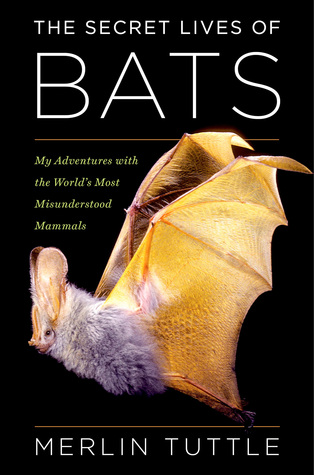
The Secret Lives of Bats by Merlin Tuttle
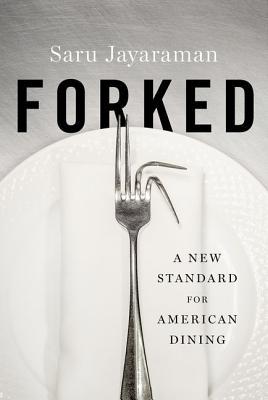
Forked: a new standard for American dining by Saru Jayaraman
There are TONS of books about the evils of industrial food production, but Forked looks as another evil in the food industry - how cooks and wait staff are mistreated and underpaid. I think people expect that in the fast food industry, but in many mid-level and higher-end restaurants the wait staff are barely getting by and your food might be prepared by someone with the flu because most restaurant staff don't get paid sick leave and can't afford to not come in to work. I liked how the author broke down the book by type of restaurant to show that good and bad can be in any price level or type of restaurant. In each chapter she talks about that type of restaurant and then gives both a good and bad example restaurant. The author also talks a lot about the Restaurant Opportunities Centers United (ROC) that she co-founded and c0-directs that helps encourage and support long-term, sustainable changes to the restaurant industry and how its workers are treated. This is definitely an eye-opening look at an aspect of the restaurant industry.
Some quotes I liked:
"In fact, the restaurant industry is the single largest source of sexual-harassment complaints to the EEOC of any industry in the United States. Seven percent of American women work in restaurants, but 37 percent of all sexual harassment complaints to the EEOC come from the restaurant industry." (p. 11)
"Eighty percent of the almost seven hundred restaurant workers surveyed reported experiencing sexual harassment in their restaurant workplace, and 50 percent experience sexual behaviors that were scary or unwanted. Worst of all, women in states that paid the tipped-worker minimum (often $2.13 an hour) experienced twice the rate of sexual harassment from customers as they did in states that paid the same wage to tipped and nontipped workers...In sum: our research showed that when workers were not reliant on customers for a base wage, they were less likely to be sexually harassed." (p. 38)
Some quotes I liked:
"In fact, the restaurant industry is the single largest source of sexual-harassment complaints to the EEOC of any industry in the United States. Seven percent of American women work in restaurants, but 37 percent of all sexual harassment complaints to the EEOC come from the restaurant industry." (p. 11)
"Eighty percent of the almost seven hundred restaurant workers surveyed reported experiencing sexual harassment in their restaurant workplace, and 50 percent experience sexual behaviors that were scary or unwanted. Worst of all, women in states that paid the tipped-worker minimum (often $2.13 an hour) experienced twice the rate of sexual harassment from customers as they did in states that paid the same wage to tipped and nontipped workers...In sum: our research showed that when workers were not reliant on customers for a base wage, they were less likely to be sexually harassed." (p. 38)
No comments:
Post a Comment